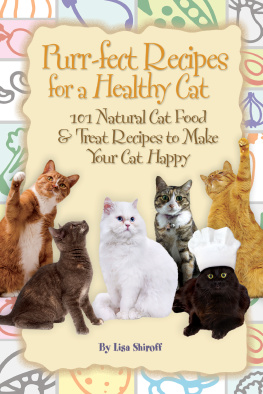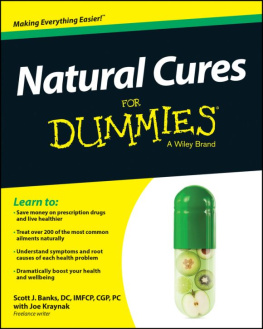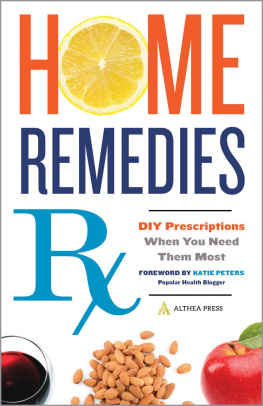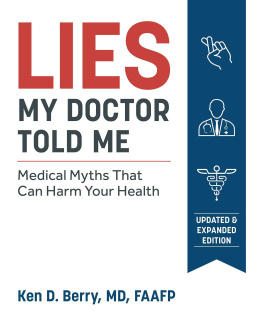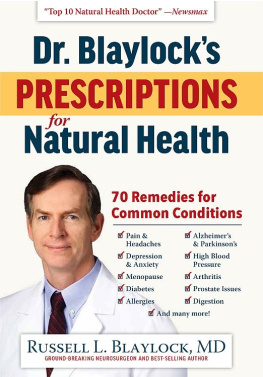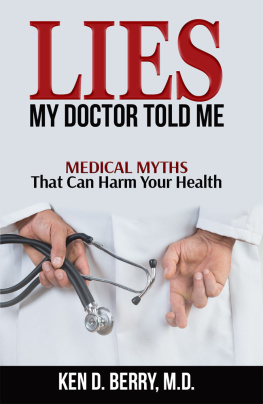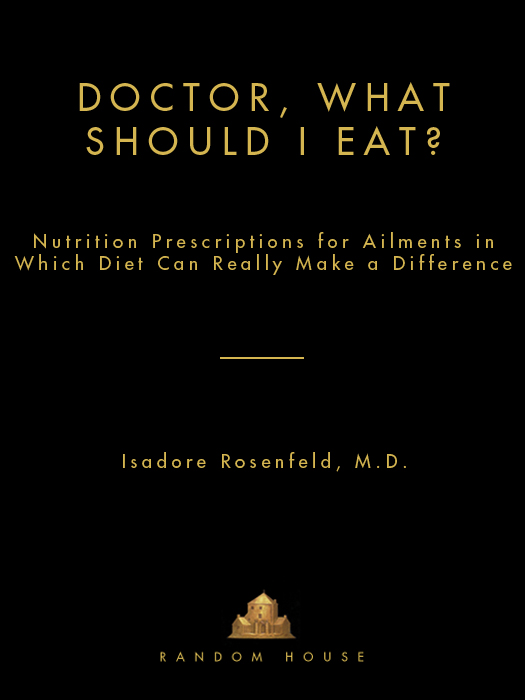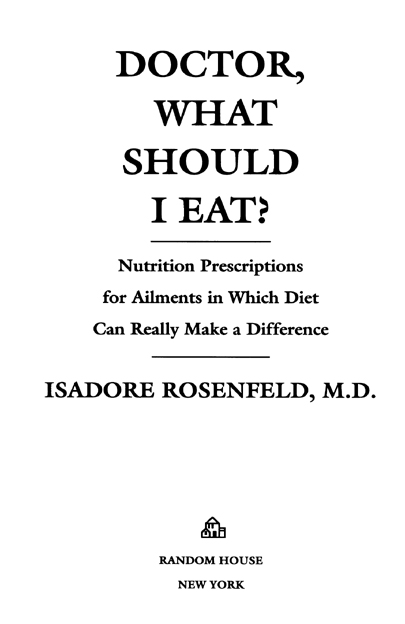Copyright 1995 by Isadore Rosenfeld, M.D.
All rights reserved under International and Pan-American Copyright Conventions. Published in the United States by Random House, Inc., New York, and simultaneously in Canada by Random House of Canada Limited, Toronto.
Grateful acknowledgment is made to Little, Brown and Company and Curtis Brown, Ltd., for permission to reprint Requiem from Verses From 1929 On by Ogden Nash. Copyright 1938 by Ogden Nash. Copyright renewed. Rights throughout the world excluding the United States and Canada are controlled by Curtis Brown, Ltd. Reprinted by permission of Little, Brown and Company and Curtis Brown, Ltd.
Library of Congress Cataloging-in-Publication Data
Rosenfeld, Isadore.
Doctor, what should I eat? / Isadore Rosenfeld.
p. cm.
eISBN: 978-0-307-80726-7
1. Diet therapy. 2. Nutrition. I. Title.
RM216.R833 1995
615.854dc20 94-8942
v3.1
PREFACE:
WHY THIS IS NOT THE USUAL DIET BOOK
When is the last time your doctor said to you, Here, let me give you a list of the foods that will help you feel better, or Cmon, lets go to the supermarket. Ill show you which foods to buy and how to read their labels? When did he or she last look in your grocery cart to see how youre feeding your family? Probably never, unless, of course, youre married to your doctor or are catering his or her next party. But does your doctor give you prescriptions to bring to your pharmacist specifying what drugs you need and how to take them? You bet! Thats what doctors do best. They give you medicationand they shouldbecause many drugs are lifesaving. But thats not enough. Proper medical care should also include advice about the right foods to eat to help you prevent illness as well as to help cure it. There should be no contest or confrontation between diet and medication; it is not a matter of either/or. Too many nutrition enthusiasts and holistic practitioners decry the use of pharmacologic agents, while traditional doctors dont pay enough attention to the importance of your diet. Yet almost every major medical condition you can think of is either caused or affected in some way by what you eat. Ulcers, kidney or liver malfunction, anemia, asthma, heart disease, hemorrhoids, diverticulitis, diabetesyou name itfor these and other conditions the right diet can help, and the wrong one can hurt.
Everybody pays lip service to the importance of food in the prevention and management of disease. But in the real world, when youre sick, youre on your own as far as nutrition is concerned. Chances are you dont ask the question Doctor, what should I eat? often enough, and when you do, its rarely answered.
Why dont more doctors pay enough attention to nutrition? Because theyre not comfortable with it. They almost certainly never studied it in medical school. Your own physician probably never took a single course in nutrition! Even today, nutrition is a required course in only 25 percent of medical schools. It is still an elective in the rest, and thats not enough to really get into the subject or to impress future doctors with its importance. So over the years, the medical establishment has left the matter of diet to health food enthusiasts, many of whom they view as nuts.
Even doctors who are trained to give you nutritional guidance dont provide it nearly often enough because the system punishes them for doing so. Insurance companies, for some reason, are more interested in what a doctor does than what he or she says! Removing a cinder from your eye or lancing a boil, both of which take only a few moments, are generously reimbursed. But you wont even find a place on your insurance claim form to record the time spent by your doctor explaining the importance of lifestyle, exercise, weight loss, alcohol and substance abuse, birth controland nutrition. These are only some of the reasons why you are likely to receive either a vague answer or no answer at all when you ask, Doctor, what should I eat?
Most patients dont hound their doctors for nutritional guidance, either. Most of us would just as soon not restrict our diet in any way. Its a relief to leave your doctors office without having been told to forgo a favorite food. Who wouldnt rather take a pill and eat whatever he or she likes than follow any diet, whether its to lose weight or to lower cholesterol? Unfortunately, no such pill exists, and, in any event, in every medicine theres a little poison. And, lets face it. Nutrition can be boring! It conjures up words and phrases like milligrams, deciliters, percentage of total calories, as well as charts, exchange tables, food scalesall of which are Greek to most people. Who wants to sit down to dinner with a calculator?
When people cant get simple, direct nutritional information from their doctor, they turn elsewhere. Unfortunately, its not always to trained dieticians or nutritionists (who tend to turn people off with the mechanics of nutrition), but rather to self-styled authorities whose credentials are wanting or nonexistent. Dispensing bad nutritional advice can be as harmful as prescribing the wrong drug, but unlike medication, which cannot be sold until the Food and Drug Administration checks it out for safety and efficacy, food is not regulated.
I am an establishment physician, and I use every effective medication at my disposal to treat the sick. That was the subject of my last book, The Best Treatment. In this volume, I focus on nutritionto help you work with your doctor, with a nutritionist if necessary, and maybe even with your grocer, to make sure that what you eat is good for you.
This book spells out specifically what you should and should not eat for more than seventy common disorders in which nutrition can really make a difference. In each one, I have explained the nature of the disease, how it develops, as well as how and why the food you consume can affect its outcome. (I have also indicated which medications are called for, because combining the right diet and drugs produces the best results.) The diseases and symptoms I have selected are those I have come across most often in my own practice. I have omitted some that are either very uncommon, or in which the role of diet has not been clearly and scientifically established. If your doctor wont go food shopping with you, take this book along instead. Its the next best thing!
I want to be very clear on one point: This book is not a substitute for a doctors care. No book is. Your doctor knows you best, and you should consult him or her about any medical conditionbefore you put the advice in this or any other health book to work. This is especially important because, as I just mentioned, for many of the conditions I describe here, eating the right foods is most effective when combined with taking the right medicationswhich only your doctor can prescribe. For every one of my books for the general public, my goal has been to help patients communicate better with their doctors. I hope youll use this book together to make you healthier and happier.
Ms. Sandra Pressman, a registered dietician with a masters degree in nutrition, is an experienced, practicing dietician with whom I have worked closely for some time. (To find an R.D. near you, contact the American Dietetic Association for a recommendation.) Sandy has verified, amplified, and translated my medical advice into practical


